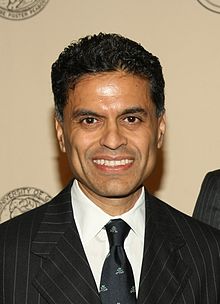The Post Prints Fareed Zakaria’s Fake News on Iran

A May 25, 2017 Washington Post Op-Ed by CNN host Fareed Zakaria misled readers about the extent of the Islamic Republic of Iran’s connection to terrorist groups.
Zakaria’s commentary (“How Saudi Arabia Played Donald Trump”) focused on Saudi Arabia’s connection to Islamist terror groups. The host of CNN’s self-described “flagship foreign affairs show,” entitled GPS, correctly pointed out that “for five decades, Saudi Arabia has spread its narrow, puritanical and intolerant version of Islam—originally practiced almost nowhere else—across the Muslim world.” That ideology, Wahhabism, has influenced Islamist terror groups, including the Islamic State of Iraq and Syria (ISIS) and al-Qaeda.
Zakaria provided Post readers with details about how the Kingdom has exported Wahhabism via Saudi-funded mosques, clerics and programs. But when discussing Iran’s support of terrorism the CNN host stumbled, claiming that it “would be wildly inaccurate to describe” Tehran as the “source of jihadist terror.”
Doubling down, Zakaria asserted:
“More than 94 percent of deaths caused by Islamic terrorism since 2001 were perpetrated by the Islamic State, al-Qaeda and other Sunni jihadists. Iran is fighting those groups, not fueling them. Almost every terrorist attack in the West has had some connection to Saudi Arabia. Virtually none has been linked to Iran.”
However, this both minimizes and misleads on Iran’s role in supporting terrorism. As CNN itself has noted, in 2016 the U.S. State Department declared Iran to be the “top state sponsor of terror (“State Department report finds Iran is top state sponsor of terror,” June 2, 2016).” Tehran received this dubious distinction in numerous previous years as well.
Zakaria would have readers believe that Iran is merely a “destabilizing force in the Middle East” that “supports some very bad actors.”
Massive international terrorist organizations, such as Hezbollah—which, from its Lebanese safe haven controls about as much territory as ISIS—receive extensive Iranian support. Hezbollah has conducted terrorist attacks in the Western hemisphere, including the 1992 and 1994 bombings of Jewish day care and community centers in Argentina. In 2011, an Iranian plot to blow up a Washington D.C. restaurant—an attempt to murder a Saudi official—was foiled. That plot emanated from the Islamic Revolutionary Guard Corps (IRGC), a massive entity that trains U.S.-designated terrorists groups, such as Hamas, Palestinian Islamic Jihad, and others as Yaacov Katz and Yoaz Hendel noted in their 2012 book Israel Vs. Iran: The Shadow War.
Indeed, Iran funds numerous Sunni terrorist groups that have murdered Americans. In addition to Palestinian terror groups like Hamas and PIJ, Iran also has ties to al-Qaeda. The bipartisan 9/11 commission report, which investigated the Sept. 11, 2001 al Qaeda terror attacks — the largest mass casualty terrorist attack in U.S. history — pointed out that there was “strong evidence that Iran facilitated the transit of al Qaeda members into and out of Afghanistan before 9/11, and that some of these were future 9/11 hijackers.” After the U.S. invasion of Afghanistan in 2001, many al Qaeda terrorists fled to neighboring Iran — where they received sanctuary under the guise of “home detention.” The Islamic Republic refused to extradite them to their home countries for prosecution. And, as CAMERA noted in a September 8, 2016 Washington Times Op-Ed, the U.S. has sanctioned numerous top al-Qaeda officials who were residing in Iran—including a son of Osama bin Laden, the terror group’s founder.
Many in the media have frequently failed to note the Islamic Republic’s ties to terror groups, including al-Qaeda and its descendant and future rival, ISIS. Zakaria, with his academic credentials, regular Washington Post columns, and CNN show, has contributed to this misunderstanding.
More from SNAPSHOTS
Professor John Quigley Falsely Condemns Israel and U.S. Support in His Syndicated Column
April 30, 2019
John B. Quigley In his widely distributed April syndicated opinion piece mainly about ISIS, the Islamist terrorist entity, John B. Quigley, an Ohio State University law professor, argues that claims of an imminent ISIS resurgence [...]
The New York Times’ Slow Reaction to Hamas Crackdown on Palestinian Protesters
April 4, 2019
The New York Times took a slight jab at Hamas, the terrorist organization that rules the Gaza Strip, in a recent story about Hamas's crackdown on Palestinian protesters who spoke out against its policies in [...]
CNN’s Zakaria Deals With U.S. Proclamation Recognizing Golan As Part Of Israel
April 3, 2019
Fareed Zakaria hosted an eight-minute discussion of the Golan matter at the end of his weekly (weekend) program, “Global Public Square “ (GPS) hour-long Cable News Network (CNN) broadcast. The broadcast, on both CNN and [...]
NY Times Reporter David Halbfinger Editorializes Israel as “Brutal”
March 6, 2019
New York Times Jerusalem bureau chief David Halbfinger Israel, according to the New York Times, is a brute. A March 3 news analysis piece—not an opinion piece—by the newspaper's Jerusalem bureau chief David Halbfinger uses [...]
Palestinian Malevolent Indoctrination Exposed; Mainstream Media Are Indifferent
February 26, 2019
Palestinian Media Watch (PMW), an Israel-based non-governmental organization, analyzes and presents in English to the world the ongoing inflammatory indoctrination of Palestinians in Arabic particularly via Palestinian Authority (PA) television (West Bank). PMW is a [...]
Did WCC Activists Attend A Birthday Party Promoted by Palestinian Extremist Organization?
February 4, 2019
The video is a bit fuzzy and grainy. But the footage of birthday party for Shadi Farar, a 12-year-old Palestinian boy who spent three years in an Israeli jail on charges of intent to murder, [...]
Reuters Falsely Links Jerusalem Embassy, Two-State Solution
January 9, 2019
The Jerusalem office park which houses Guatemala's embassy Multiple recent Reuters articles incorrectly report that moving the Brazilian embassy from Tel Aviv to Jerusalem is a dramatic move away from the two-state solution. For instance, [...]


